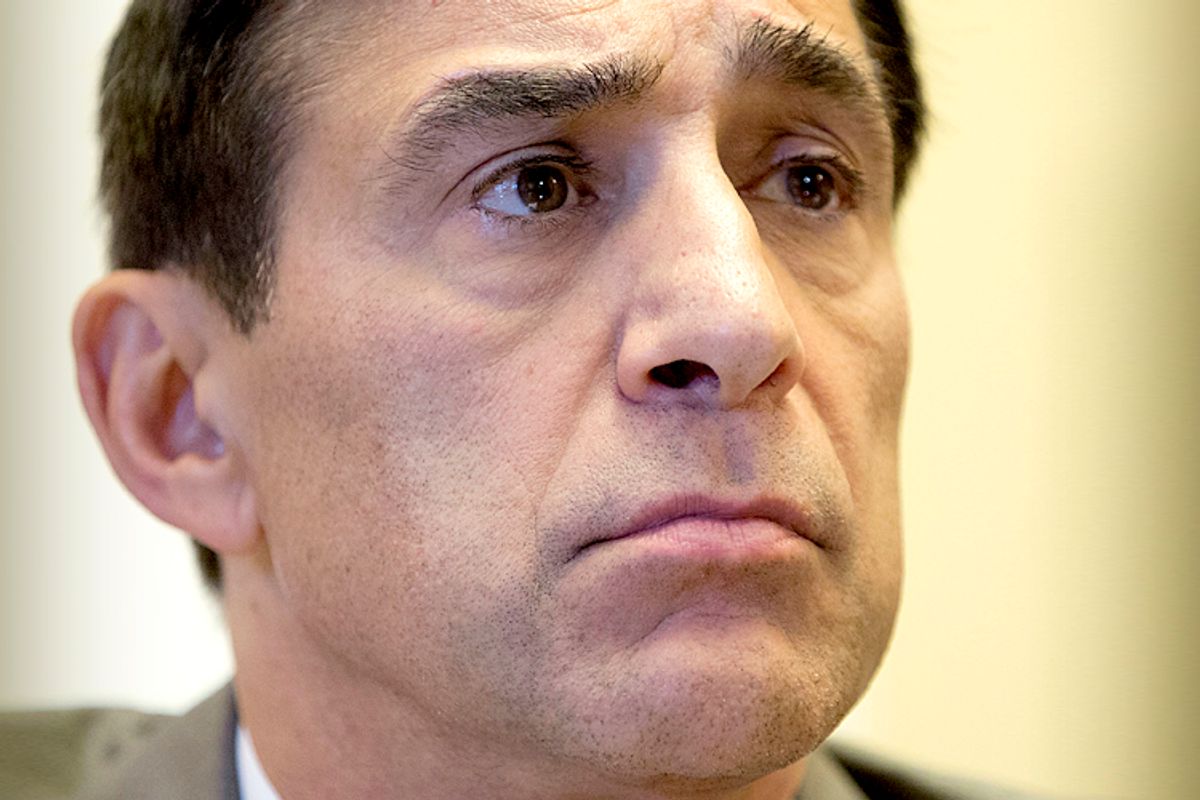As Monday night turned to Tuesday, the United States Postal Service defaulted on a legally required $5.6 billion payment toward health benefits for retired employees. The failure to make that payment is sure to be cited by those calling for more sacrifice from postal customers and workers – from USPS management to members of Congress.
But make no mistake: Congress, particularly Republicans, is mostly to blame for the problem.
That’s because the Postal Service – unlike any other public or private institution in the United States of America – is bound to pre-fund 75 years of healthcare benefits over a decade. As I’ve reported, that unique requirement – passed on a voice vote, with bipartisan support, in the final days of GOP control of Congress in 2006 – accounts for most of the Post Office’s deficit ever since. Postmaster General Patrick Donahoe testified this month in Congress that the pre-funding made up $32 billion of USPS’ $41 billion net loss since the requirement went into effect. For perspective on that remaining $9 billion, consider that a 2011 study from Accenture, commissioned by USPS, estimated that by diversifying its services as other countries’ mail agencies have, the Postal Service could’ve brought in an additional $74 billion from 2003 to 2008.
But the same 2006 law that saddled USPS with the pre-funding requirement also restricted its ability to offer “non-postal services,” as well as its ability to raise the cost of stamps. And so all sides in the long-running, under-the-radar debate over the future of the post office agree that any resolution will require an act of Congress.
“Let’s be clear,” Sen. Bernie Sanders told Salon in a Monday email. “During the first 11 months of the current fiscal year, the Postal Service has been profitable delivering mail and packages to every household and business in America.” Sanders added that the “sole reason” for this year’s deficit was the “unprecedented and onerous mandate” on pre-funding “insisted upon by George W. Bush.”
The White House, USPS and Rep. Darrell Issa -- in many ways the leader of this effort -- did not respond to Monday inquiries.
Right now, the action in the Senate centers around a bipartisan bill from Sens. Tom Carper, D-Del., and Tom Coburn, R-Okla., that, while allowing USPS greater freedom to diversify services and raise rates, would also let management reduce delivery and further cut labor costs including workers’ compensation claims. That echoes several of the proposals of Postmaster General Donahoe. Sen. Carper told a Sept. 19 hearing that USPS “needs to be granted the authority from Congress to make decisions similar to those that our auto companies made in recent years in right-sizing that industry and enabling it to succeed despite the challenges it faces in the 21st century marketplace.”
These wouldn’t be the first big cuts: The postmaster noted in his own testimony that already, “The Postal Service’s current career workforce of 492,000 is the smallest it has been in decades and is down nearly 26 percent in the past five years.” Donahoe told Congress that USPS faced an “ongoing decline” due to “migration toward electronic communication and transactional alternatives.” In an interview with Salon last year, USPS CFO Joe Corbett defended USPS’ approach on the grounds that “any financial enterprise would do it.”
Postal unions counter that service cuts will only damage USPS’ viability, and that cutting compensation after union members already negotiated major concessions is unnecessary and unjust. In a Monday email to Salon, National Rural Letter Carriers Association president Jeanette Dwyer warned against “drastic measures that will only harm this great institution, the Americans who rely upon it, and the employees who serve it with determination, integrity, and pride.” American Postal Workers Union executive vice president Greg Bell told Salon that the Carper-Coburn bill represented “part of the agenda toward privatization,” both by driving customers away to private companies and by deepening the Postal Service’s long-term crisis. “From our perspective,” said Bell, “that is what this is all about.”
A USPS plan to end Saturday mail delivery, a concept backed by the White House, was temporarily blocked by Congress earlier this year.
Although the Postal Service -- unlike the private sector competitors who stand to gain if it declines – is legally bound to provide the public service of ensuring mail delivery to far-flung addresses across the country, none of the key players in the debate are proposing that the federal government spend taxpayer dollars to directly subsidize its functions. (Not even socialist Sen. Sanders.)
While postal unions vigorously oppose the Senate’s approach, they face even worse in the House, where Darrell Issa has for years been urging deep cuts. Echoing right-wing approaches to troubled school districts and the City of Detroit, Issa has proposed creating a board empowered to override both management decisions and union contracts if the USPS misses any financial obligations – like the one it defaulted on this week.
Sen. Sanders told Salon that a bill he’s introduced, which unions back, would “give the tools the Postal Service needs to succeed in the 21stcentury and ensure the speedy delivery of mail.” In contrast, he charged, both Carper’s and Issa’s approaches “will force the Postal Service to provide fewer services and lead to the loss of more than 100,000 jobs in the midst of a severe recession. That’s not the way to save the Postal Service, that’s the way to dismantle it.”



Shares